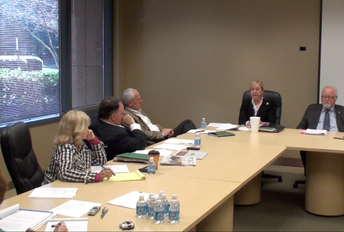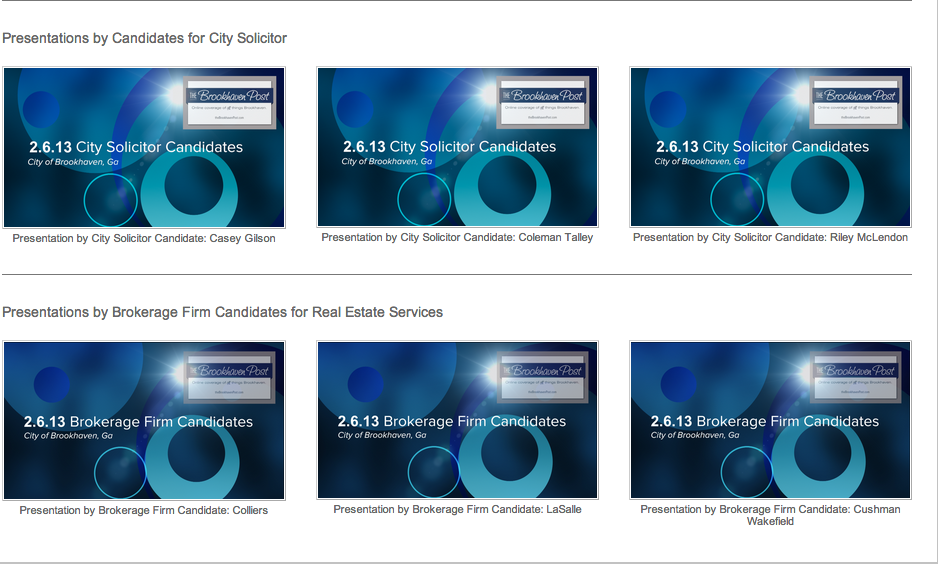
Present*:
Mayor J Max Davis, District 1 Councilwoman – Rebecca Chase Williams, District 2 Councilman – Jim Eyre, City Clerk – Susan Hiott, Interim City Manager – Marie Garrett, Interim City Attorney – Bill Riley, * District 3 Councilman – Bates Mattison, joined later
The meeting got under way with a review of the City Charter by Bill Riley. The first topic was a discussion on Term Limits.
"We’ve looked at that [Term Limits for the Mayor] and term limits are only of course for the Mayor, there’s been some discussion of having 2 full terms instead of a partial term and a full term for the Mayor. After some research we think that probably we’re going to need to have that passed at the Legislature rather than by home rule since it is an election matter”, said Riley. “If that’s something that you [Mayor Davis] desire we can certainly get it into this years hopper and see if we can’t get it through if that would be the desire of the Council on that.”
Mayor J Max Davis, District 1 Councilwoman – Rebecca Chase Williams, District 2 Councilman – Jim Eyre, City Clerk – Susan Hiott, Interim City Manager – Marie Garrett, Interim City Attorney – Bill Riley, * District 3 Councilman – Bates Mattison, joined later
The meeting got under way with a review of the City Charter by Bill Riley. The first topic was a discussion on Term Limits.
"We’ve looked at that [Term Limits for the Mayor] and term limits are only of course for the Mayor, there’s been some discussion of having 2 full terms instead of a partial term and a full term for the Mayor. After some research we think that probably we’re going to need to have that passed at the Legislature rather than by home rule since it is an election matter”, said Riley. “If that’s something that you [Mayor Davis] desire we can certainly get it into this years hopper and see if we can’t get it through if that would be the desire of the Council on that.”
District 1 Councilwoman, Rebecca Chase Williams questioned whether or not they were discussing the Mayor only or term limits for the entire Council. Riley answered that the Council has no term limits – only the Mayor. Mayor Davis offered, “we are talking about the Mayor, but we were also going to consider everybody being on the same schedule.” Bill Riley responded, “If that’s the desire of the Council and the Mayor, …we can put it together any way that you all give us direction but it probably needs to be sooner than later so we can vote and move it on through.”
Setting term limits for Council or changing the term limits for Mayor - as spelled out in the City Charter – would be a change to the Charter and require legislative approval. This would be the first change to the Charter if this direction is desired.
Mayor Davis led into the next item on the agenda – Creation of a Development Authority and Recreation Authority – “Would that have to be a Charter change as well?” Davis asked Riley. Riley answered, “No it won’t. We can do a Development Authority by resolution or ordinance, under state law…we can’t do a Redevelopment Authority…but a Development Authority or a downtown Development Authority are things that we can do. So if you desire, we can by resolution put together a Development Authority – it has to have between 7 and 9 members, they have to be citizens of the city…you can only have one member of the governing authority as a member of the Board of Directors and they must be tax payers…basically the powers, it’s pretty much unfettered powers in terms of being able to issue bonds, acquire property, sell property, lease property - both personal and real – make loans…it all has to tie into Develop, Promote, Commerce, Industry, and Employment Opportunities for the Public Good and the General Welfare.”
Much more on this topic in the video here at the 2:00 minute mark and runs to the 27:35 mark.
Next Topic: (Video mark 27:36) Review Relationship per Charter of Elected Officials, staff, and city manager and lines of authority relative to appointment of Boards/Commissions, and professional service contracts – and this dovetails into the last item on the agenda – Ethics and Code of Ethics Ordinance.
“The Mayor and Council have powers, generally the 47 powers that are listed in the front [of the Charter]. You have all the powers of the City. The real question becomes, how are the exercised…and that’s the crux of what goes on.”, Riley explained. “The Mayor has specific powers…and those specific powers are to preside over meetings of the council, set the agenda, however, if two other councilmembers want something on the agenda they have an opportunity to do that – as long as 2 or more want it on there, the Mayor acts as the ceremonial head of the City, the Mayor signs the orders, checks, and warrants to a level of authorization by the council. The Mayor votes on ties, makes all city appointments as provided by the Charter, (subject to the confirmation of the City Council), and serves in part-time capacity.”
The discussion led by Riley went on to explain that the Mayor and Council should defer to the City Manager to engage the various City Departments and that the City Manager should be the Mayor and Councils first point of contact when a particular effort by a department is needed.
Rebecca Chase Williams, District 1 Council, asked about the procedure to follow if a constituent or a developer calls her – or other councilpersons as they have all extended an invitation to be contacted if needed. Riley explained that accepting the call is not the problem – directing a City department to perform work instead of forwarding the issue to the City Manager IS a problem and should not be done. The City Manager runs the Departments. “You have a very loyal staff here and you put them in a bind if you ask them to actually do stuff”, said Riley. “because they know they are supposed to report to her [pointing to Garrett – Interim City Manager].”
Riley explained that if the departments act on requests from the Mayor and Council without going through the City Manager, it could cause corrective action.
Marie Garrett added to the discussion, “I agree with Bill and his interpretation of the chain of command. It does help me to know if staff is being directed because I may have things for them to do. Another thing that is important…is because of the make up of your departments being vendor oriented, they are all driven by contracts and task orders. If in the event Council approaches staff and asks them to repair a certain report, develop a certain study, or even an ordinance [for example], that could trigger a contract amendment or a change order in the contract.”
This discussion ran until the end of the reports portion of meeting and the entire discussion can be viewed in the video here.
The meeting pushed on to presentations by candidates for City Solicitor and Brokerage Firms for Real Estate Services before discussion and Adjournment.
Setting term limits for Council or changing the term limits for Mayor - as spelled out in the City Charter – would be a change to the Charter and require legislative approval. This would be the first change to the Charter if this direction is desired.
Mayor Davis led into the next item on the agenda – Creation of a Development Authority and Recreation Authority – “Would that have to be a Charter change as well?” Davis asked Riley. Riley answered, “No it won’t. We can do a Development Authority by resolution or ordinance, under state law…we can’t do a Redevelopment Authority…but a Development Authority or a downtown Development Authority are things that we can do. So if you desire, we can by resolution put together a Development Authority – it has to have between 7 and 9 members, they have to be citizens of the city…you can only have one member of the governing authority as a member of the Board of Directors and they must be tax payers…basically the powers, it’s pretty much unfettered powers in terms of being able to issue bonds, acquire property, sell property, lease property - both personal and real – make loans…it all has to tie into Develop, Promote, Commerce, Industry, and Employment Opportunities for the Public Good and the General Welfare.”
Much more on this topic in the video here at the 2:00 minute mark and runs to the 27:35 mark.
Next Topic: (Video mark 27:36) Review Relationship per Charter of Elected Officials, staff, and city manager and lines of authority relative to appointment of Boards/Commissions, and professional service contracts – and this dovetails into the last item on the agenda – Ethics and Code of Ethics Ordinance.
“The Mayor and Council have powers, generally the 47 powers that are listed in the front [of the Charter]. You have all the powers of the City. The real question becomes, how are the exercised…and that’s the crux of what goes on.”, Riley explained. “The Mayor has specific powers…and those specific powers are to preside over meetings of the council, set the agenda, however, if two other councilmembers want something on the agenda they have an opportunity to do that – as long as 2 or more want it on there, the Mayor acts as the ceremonial head of the City, the Mayor signs the orders, checks, and warrants to a level of authorization by the council. The Mayor votes on ties, makes all city appointments as provided by the Charter, (subject to the confirmation of the City Council), and serves in part-time capacity.”
The discussion led by Riley went on to explain that the Mayor and Council should defer to the City Manager to engage the various City Departments and that the City Manager should be the Mayor and Councils first point of contact when a particular effort by a department is needed.
Rebecca Chase Williams, District 1 Council, asked about the procedure to follow if a constituent or a developer calls her – or other councilpersons as they have all extended an invitation to be contacted if needed. Riley explained that accepting the call is not the problem – directing a City department to perform work instead of forwarding the issue to the City Manager IS a problem and should not be done. The City Manager runs the Departments. “You have a very loyal staff here and you put them in a bind if you ask them to actually do stuff”, said Riley. “because they know they are supposed to report to her [pointing to Garrett – Interim City Manager].”
Riley explained that if the departments act on requests from the Mayor and Council without going through the City Manager, it could cause corrective action.
Marie Garrett added to the discussion, “I agree with Bill and his interpretation of the chain of command. It does help me to know if staff is being directed because I may have things for them to do. Another thing that is important…is because of the make up of your departments being vendor oriented, they are all driven by contracts and task orders. If in the event Council approaches staff and asks them to repair a certain report, develop a certain study, or even an ordinance [for example], that could trigger a contract amendment or a change order in the contract.”
This discussion ran until the end of the reports portion of meeting and the entire discussion can be viewed in the video here.
The meeting pushed on to presentations by candidates for City Solicitor and Brokerage Firms for Real Estate Services before discussion and Adjournment.





